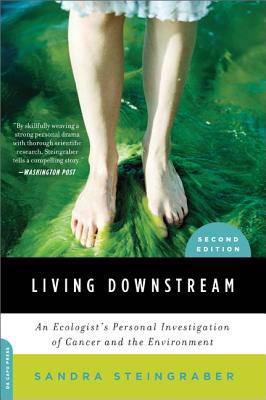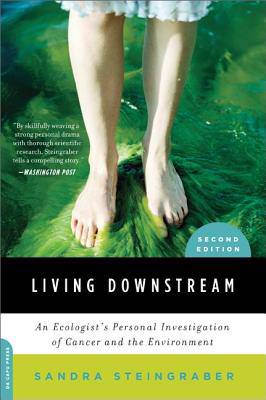
- Retrait gratuit dans votre magasin Club
- 7.000.000 titres dans notre catalogue
- Payer en toute sécurité
- Toujours un magasin près de chez vous
- Retrait gratuit dans votre magasin Club
- 7.000.000 titres dans notre catalogue
- Payer en toute sécurité
- Toujours un magasin près de chez vous
Living Downstream
An Ecologist's Personal Investigation of Cancer and the Environment
Sandra Steingraber
Livre broché | Anglais
36,95 €
+ 73 points
Description
Sandra Steingraber, biologist, poet, and survivor of cancer in her twenties, brings all three perspectives to bear on the most important health and human rights issue of our time: the growing body of evidence linking cancer to environmental contaminations. Her scrupulously researched scientific analysis ranges from the alarming worldwide patterns of cancer incidence to the sabotage wrought by cancer-promoting substances on the intricate workings of human cells. In a gripping personal narrative, she travels from hospital waiting rooms to hazardous waste sites and from farmhouse kitchens to incinerator hearings, bringing to life stories of communities in her hometown and around the country as they confront decades of industrial and agricultural recklessness. Living Downstream is the first book to bring together toxics-release data -- now finally made available through under the right-to-know laws -- and newly released cancer registry data. Sandra Steingraber is also the first to trace with such compelling precision the entire web of connections between our bodies and the ecological world in which we eat, drink, breathe, and work. Her book strikes a hopeful note throughout, for, while we can do little to alter our genetic inheritance, we can do a great deal to eliminate the environmental contributions to cancer, and she shows us where to begin. Living Downstream is for all readers who care about the health of their families and future generations. Sandra Steingraber's brave, clear, and careful voice is certain to break the paralyzing silence on this subject that persists more than three decades after Rachel Carson's great early warning.
Spécifications
Parties prenantes
- Auteur(s) :
- Editeur:
Contenu
- Nombre de pages :
- 440
- Langue:
- Anglais
Caractéristiques
- EAN:
- 9780306818691
- Date de parution :
- 23-03-10
- Format:
- Livre broché
- Format numérique:
- Trade paperback (VS)
- Dimensions :
- 155 mm x 226 mm
- Poids :
- 521 g







